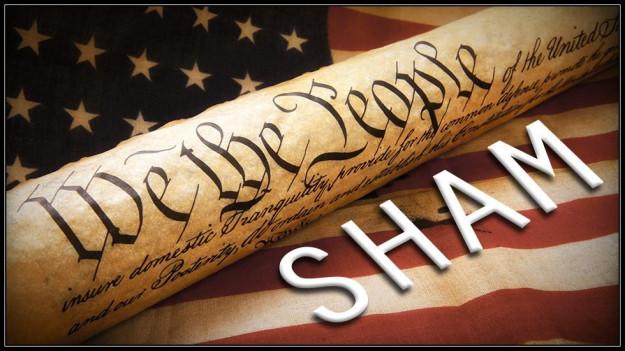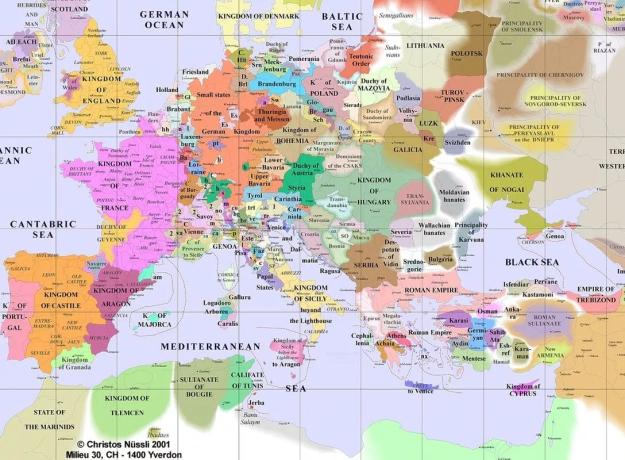One reason for the failure of the modern conservative and libertarian movements to scale back, in even a miniscule way, the now gargantuan US welfare/warfare state has been the misinterpretation of the US Constitution. Many conservatives have a slavish devotion to the document, placing it on a par with the Ten Commandments and New Testament.
A typical misunderstanding of the Constitution’s history and content appeared in this recent op-ed:
The Constitution was intended to limit 1) the power of government over the citizenry 2) the power of each branch of government and 3) the power of political/financial elites over the government and the citizenry, as the Founders recognized the intrinsic risks of an all-powerful state, an all-powerful state dominated by one branch of government and the risks of a financial elite corrupting the state to serve the interests above those of the citizenry.
The author, like so many “Constitution enthusiasts” has also been hostile to the Medieval era, denigrating its institutions and social constructs – feudalism, aristocracy, crusading – when, in fact, the Middle Ages, in many respects, were far freer with less government than the present epoch.
When the founding fathers decided to meet in Philadelphia in 1787, they did so at first to “amend” the Articles of Confederation which had guided the young country through some perilous times. While the Articles had some defects (some libertarians even contend that they were too statist), the delegates, at first, did not want it scrapped, however, it was the “leading lights” of the convention which connived to completely do away with it.
By superior political maneuvering, the pro-Constitution forces were able to ramrod their plan through despite being in the minority. Not only were the majority of the delegates initially against scrapping the Articles, but most Americans were opposed to the creation of a new central government.
Despite this, the Constitution was ruthlessly pushed through and, as its opponents feared, America would be saddled with a highly centralized national government, the loss of considerable state sovereignty, and the eventual erosion of individual liberties even with the inclusion of a Bill of Rights.
A brief examination of the document reveals that its implicit and explicit language grants wide latitude for the expansion of state power. In its Preamble, the ambiguous clause to “promote the general welfare” can and has led to all sorts of destructive social engineering schemes. More ominously, for anyone that is under the illusion that America is governed by a “federal” system, they should reread Article VI which in part says
This Constitution, and the Laws of the United his Constitution, and the Laws of the United States which shall be made in Pursuance thereof; and all Treaties made, or which shall be made, under the Authority of the United States, shall be the supreme Law of the Land.[emphasis added]
An all-powerful central state went against much of Western history after the fall of the Roman Empire and the idea was always feared by philosophers. Basic political theory and practical experience showed that a multitude of sovereign states were preferable not only for the protection of personal liberty, but for economic growth. Numerous states and jurisdictions were a far greater check on government than the much celebrated “separation of powers” concept of constitutional government.
Under the Articles of Confederation, each individual state was autonomous while the national government had to rely on the states for most of its support. Unfortunately, it will never be known what would have happened if the country remained as a confederacy of states, it is likely however, that there would have been less bloodshed, greater economic growth, and more personal freedom under a decentralized regime.
It is curious, therefore, why so many on the Right continue to revere the Constitution as some great bulwark against state power. Much of it probably stems from ignorance or personal bias against the political conditions which existed prior to the late 18th century.
Much of European history was under the sway of monarchial and aristocratic rule and the integral presence of the Catholic Church in society with a diffusion of power among kings, princes, dukes and Churchmen. While far from perfect, the social order which existed under Christendom may not have been as materially or technologically advanced as contemporary times, but in regard to morality, justice, and individual freedom, there is no comparison. The Christian age saw nothing of the social depravity, war making with its mass murder, the trampling of individual rights, and the existence of totalitarian government as witnessed in the supposedly “enlightened” modern age.
Decentralized Europe of 1300
Until it is realized that the Constitution is an impediment to rolling back the American Leviathan, there will be little progress in the fight for individual liberty and economic progress.
via ZeroHedge News https://ift.tt/2EEvJSW Tyler Durden

